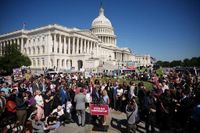On September 3, 2025, the U.S. Capitol became the epicenter of a renewed fight for transparency and justice as survivors of Jeffrey Epstein’s abuse joined lawmakers and advocates to demand the full release of all investigative files related to the disgraced financier’s decades-long sex trafficking operation. The air was thick with emotion and urgency, as women who had endured unspeakable abuse stood shoulder to shoulder with members of Congress, vowing that the truth would not be buried any longer.
The push for full disclosure comes just one day after the House Oversight and Reform Committee released 33,295 pages of subpoenaed records from the Justice Department. While the sheer volume of documents might sound impressive, many lawmakers and advocates were quick to point out that the vast majority of the information was already public, offering little in the way of new revelations. "Fact check: nearly everything Republicans just supposedly ‘released’…has already been released," Rep. Jim McGovern, D-Massachusetts, posted on social media, echoing the frustration felt by many who have waited years for answers.
At the heart of the Capitol Hill events was a bipartisan effort led by Rep. Thomas Massie, R-Kentucky, and Rep. Ro Khanna, D-California. The two lawmakers are spearheading a discharge petition—essentially a procedural maneuver to bypass House leadership and force a floor vote—to compel the Justice Department to release all remaining Epstein files. As of September 3, they needed just two more Republican signatures to reach the critical threshold of 218 and move the petition forward. "This is a litmus test. Can we drain the swamp? Are there people who are outside of the reach of the law? I don't think there should be," Massie declared at the press conference, according to USA Today.
The survivors’ voices took center stage, bringing the human toll of Epstein’s crimes into sharp focus. Arick Fudale, an attorney representing 11 Epstein survivors, introduced Rosa, a woman trafficked from Uzbekistan in 2009 who had never before spoken publicly. Fudale minced no words: "None of you should have to be here today because they should just release the files. No more slow-rolling. No more meetings. No more strategy. No more interviews behind closed doors. Release the files."
Among the most powerful moments came when Sky Roberts, brother of the late Virginia Roberts Giuffre—one of Epstein’s most prominent accusers—spoke tearfully to the assembled crowd. "No leniency, no deals, no special treatment. The Epstein documents must be unsealed. Every name, every detail. No more secrets, no more protection for those who preyed on the vulnerable," he insisted. His wife Amanda then read from Virginia’s journal, offering a poignant reminder of the stakes: "I look forward to the days when money and power does not stop the truth from coming out and the righteous prevail."
Theresa J. Helm, another survivor, recounted in harrowing detail how she was "systematically recruited, trafficked across this great nation, groomed and assaulted." Helm placed particular blame on Ghislaine Maxwell, Epstein’s longtime associate who is now serving a 20-year prison sentence. "Ghislaine, it was your butler that greeted me at the front door of your beautiful home, and it was your calm, manipulative and fraudulent demeanor that cultivated my trust," Helm said. Her call to action was clear: "Get rid of the perpetrators and bad actors."
Lisa Phillips, a podcaster and survivor who has become a vocal advocate for others, raised questions about the government’s role in allowing Epstein to operate for so long. "Who was he to our government that he was allowed to operate openly for decades? Why was he allowed to sponsor visas for young models, using their immigration status as leverage to abuse them and silence them?" Phillips asked during the rally. She announced plans to organize survivors to compile their own list of Epstein’s accomplices if the government would not act, declaring, "It will be done by survivors, for survivors. History is watching."
Liz Stein, another survivor, spoke at the Stand With Survivors rally near the Capitol, sharing how her encounter with Epstein and Maxwell derailed her plans for law school. "It felt like somebody shut out the lights to my soul," she said. Stein’s message was unequivocal: "This is not a partisan issue. This is a crime. The criminals must be held accountable."
The emotional toll of the day was evident. Rep. Nancy Mace, R-South Carolina, herself a survivor of sexual assault, left a private meeting with Epstein victims in tears. She later described experiencing a "full blown panic attack. Sweating. Hyperventilating. Shaking. I can’t breathe," she wrote on social media. The stories she heard, she said, were almost too much to bear.
Despite the committee’s release of tens of thousands of pages, lawmakers and advocates say the most critical information remains hidden. According to Rep. Ro Khanna, less than 1 percent of the Epstein files have actually been made public. "There is something that is rotten in Washington," Khanna said at the news conference. "We are demanding today in the discharge petition that all of the files be released."
The documents that have been released include at least eight videos of police interviews with victims from as far back as 2005 and 2006. In one such video, a 17-year-old girl—her identity concealed—describes being paid $350 by Epstein for a massage and sex. "He has the girls take off their clothes and give him a massage," she says in the 17-minute recording. Other records include audio from the criminal investigation in Florida, but names and other identifying details remain redacted.
Attorney General Pam Bondi has maintained that all releasable records are already public, and that some materials—such as pornographic videos and names of victims—cannot and should not be released to protect privacy. A federal judge has also denied requests to release grand jury transcripts, further fueling suspicions among some advocates and lawmakers that the government is withholding information.
The shadow of powerful men who may have aided or protected Epstein looms large over the ongoing debate. Former President Donald Trump, who was photographed with Epstein in the 1990s and rode on his private plane, has denied ever visiting Epstein’s private island, the site of much of the reported abuse. Ghislaine Maxwell, in a July meeting with Deputy Attorney General Todd Blanche, reportedly stated, "I never, ever saw any man doing something inappropriate with a woman of any age." Nevertheless, the demand for a full accounting of all those involved—no matter how wealthy or influential—remains central to the survivors’ quest for justice.
As the day’s rallies and press conferences made clear, the fight for transparency in the Epstein case is far from over. Survivors and their advocates are determined to keep the pressure on Congress and the Justice Department, insisting that only by bringing every fact to light can true justice be achieved for those who suffered in silence for so long.


